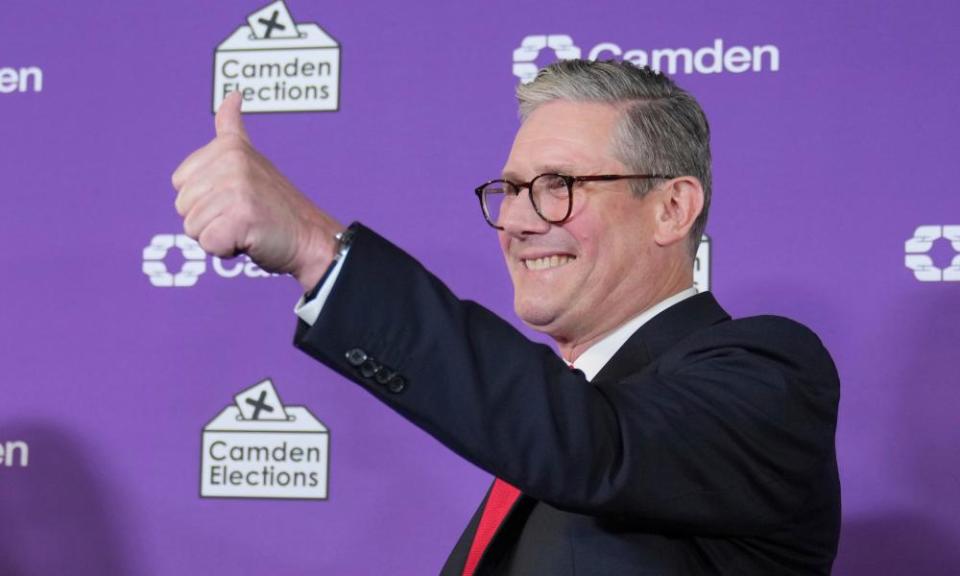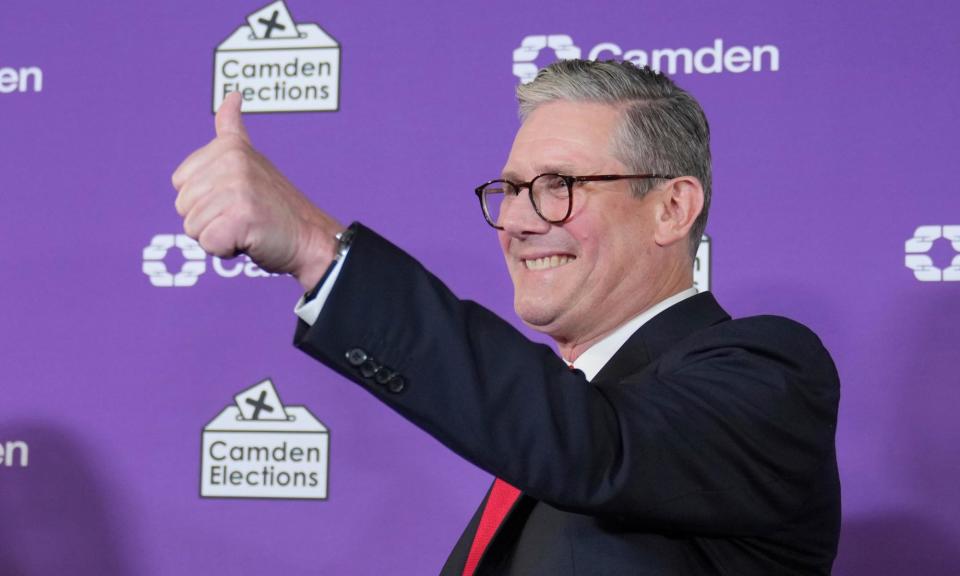Keir Starmer hails ‘sunlight of hope’ as Britain wakes up to Labour landslide
Keir Starmer has said the “sunlight of hope” is now shining in Britain again as Labour won a landslide UK election victory, bringing a crushing end to 14 years of Conservative rule.
The Labour leader is expected to officially become prime minister later on Friday after Rishi Sunak conceded, with voters giving Starmer a large mandate to bring about change in Britain.
Speaking at the Tate Modern in London, Starmer said people would be waking up to the news of a Labour victory and Tory defeat “relieved that a weight has been lifted, a burden finally removed”.
Sunak’s party is on track to record its worst performance in a general election, with a record number of cabinet ministers set to lose their seats and big names such as Liz Truss, Jacob Rees-Mogg, Penny Mordaunt and Grant Shapps ousted.
Labour had won 411 seats, while the Conservatives were on just 119, with five left to declare by 9.30am. The government’s likely majority is set to be about 170 seats. The party dominated in Scotland, with the SNP reduced to eight seats so far, while the Liberal Democrats gained at least 71 seats – their best performance ever.
A surge in votes for the Reform party suggested it would win at least four seats, with Nigel Farage, the party leader, becoming an MP in Clacton on his eighth attempt to enter parliament.
The Greens also won four seats, after surprise victories in Waveney, North Herefordshire and Bristol Central, as well as holding on in Brighton.
There were five shock victories against Labour for pro-Palestine independent candidates, with Jonathan Ashworth, one of Labour’s election chiefs, voted out in Leicester South, and the former Labour leader Jeremy Corbyn winning in Islington North. Plaid Cymru was expected to win four seats.
Labour’s huge majority was gained despite a 34% share of the vote that was only slightly higher than their performance in 2019 and less than Corbyn’s 40% in 2017. The Conservatives’ vote share plummeted by 20 percentage points to 24%, while Reform came third on 14% with the Liberal Democrats just behind on 12%.
Ed Davey’s party benefited from tactical voting against the Tories and strong showing in a limited number of areas, which accounted for its high seat count of 71 compared with four for the Reform party.
Related: UK general election 2024: five key points
In his victory speech, Starmer told a rally that change “begins now”.
“It feels good, I have to be honest,” he said. “Four and a half years of work, changing the party. This is what it is for. A changed Labour party, ready to serve our country, ready to restore Britain to the service of working people.”
Starmer promised an “age of national renewal” in which Labour would “start to rebuild our country” but he also acknowledged that change would not be easy.
The Labour leader said the “sunlight of hope was … shining once again in a country with an opportunity after 14 years to get its future back”.
In remarks conceding Labour had won, Sunak said power would “change hands in a peaceful and orderly manner, with goodwill on all sides. That is something that should give us all confidence in our country’s stability and future.”
In a speech at his election count, the prime minister said it had been a “difficult night” for his party and there was lots to reflect on.
He held his seat in Richmond, North Yorkshire, by more than 12,000 votes, and said he looked forward to continuing to serve his constituents in the “weeks, months and years ahead”.
“The British people have delivered a sobering verdict tonight, there is much to learn … and I take responsibility for the loss,” he added.
“To the many good, hard-working Conservative candidates who lost tonight, despite their tireless efforts, their local records and delivery, and their dedication to their communities. I am sorry.”
The results appeared to confirm that Labour’s “time for change” message had struck a chord with voters after years of chaos and division under the Tories, including the Brexit vote and its fallout, the handling of the Covid pandemic and the Partygate scandal.
At the last general election, in 2019, the Conservatives had a majority of 80, with 365 seats to Labour’s 203. The SNP won 48 seats and the Lib Dems had just 11.
Labour secured a huge swing away from the Conservatives, who are on course to suffer their worst ever performance, and away from the SNP in Scotland, where John Swinney’s party will have been decimated, losing more than 40 seats.
Reform’s wins in four seats came as the hard-right party squeezed the Conservative vote across the country. Lee Anderson, the former Labour councillor and ex-Tory MP, became Reform’s first confirmed MP after winning Ashfield.
Farage won the seat of Clacton in Essex, pledging to take the fight to Labour next. “We’re coming for Labour, be in no doubt about that,” he said. The Reform chair, Richard Tice, won in Boston and Skegness, previously the second safest Tory seat in the country.
The rise of Reform, which split the rightwing vote, could pose a major challenge for an incoming Starmer government, which will have to devise a strategy to fight the rise of the hard right, a trend mirrored across Europe.
Labour’s victory will nonetheless be seen as a beacon of hope for progressive parties across the globe, amid fierce election battles against the populist right in countries including France and the US.
Results showed Labour had won back vast swathes of the north of England and Midlands, the so-called “red wall”, taken by the Tories in 2019.
Starmer’s victory marks a huge turnaround for the party, four and a half years after he took over as leader and less than five since Jeremy Corbyn led the party to a disastrous defeat, its worst result since the 1930s.
It appeared to have fallen just short of Tony Blair’s historic 1997 win in which Labour won 418 seats and a majority of 179. Starmer, like Blair, fought a campaign promising change after more than a decade of Tory rule.
However, Labour lost to Corbyn in Islington North, with the former party leader taking 24,120 votes, to Labour’s 16,873. “We have shown what kinder, gentler and more sensible, more inclusive politics can bring about,” he said.
Ashworth, the shadow Cabinet Office minister who was central to Labour’s election campaign, lost his seat to a pro-Palestine independent.
The shadow culture secretary, Thangam Debbonaire, lost to the Greens in Bristol Central.
The Conservatives had suffered a disastrous night, losing dozens of seats they won for the first time in 2019 under Boris Johnson. William Hague, the former Tory leader, said it was a “catastrophic result” for the party.
Gillian Keegan, the Tory education secretary, and Alex Chalk, the justice secretary, became the first members of Sunak’s cabinet to lose their seats, both to the Lib Dems. They were followed by the defence secretary, Shapps, and the Commons leader, Mordaunt, who had both been potential leadership candidates.
Michelle Donelan, the science secretary, also lost to the Lib Dems in Melksham and Devizes, while other prominent former Tory MPs to be voted out included: Jonathan Gullis in Stoke-on-Trent North, Rees-Mogg in Somerset North East, and Thérèse Coffey in Suffolk Coastal.
“What is crystal clear to me tonight is not so much that Labour won this election but rather that the Conservatives have lost it,” Shapps said. “On door after door, voters have been dismayed by our inability to iron out our differences in private and then be united in public.”
Sunak held his seat, as did Kemi Badenoch, the business secretary; Oliver Dowden, the deputy prime minister; Victoria Atkins, the health secretary; and Claire Coutinho, the energy secretary. James Cleverly, the home secretary, also retained his seat.
Voters appear to have punished the party for years of scandals under Johnson, the financial crisis caused by Liz Truss, and Sunak’s failure to keep his pledges to turn the country around.
The loss of office follows a weak Conservative campaign by Sunak, marred by a gambling scandal and the prime minister’s early departure from a D-day ceremony, which led cabinet ministers to concede defeat even before polling day.
Labour has less than two weeks before presenting its first package of legislation in the king’s speech, including legislation to bolster workers’ rights and to set up Great British Energy, the energy generation company at the heart of Labour’s green plans.
A meeting of the European Political Community will follow immediately afterwards in London – Starmer’s first chance to lobby officially for improved trading relations and to begin work on a new deal over cross-Channel asylum seekers.
Having led a tightly controlled campaign with little in the way of spontaneous interaction with the public or new policy ideas, Starmer is under pressure to spell out in greater detail how he intends to begin tackling problems ranging from Britain’s prisons crisis to record NHS waiting lists.
Rachel Reeves is likely to present her first budget in the autumn, where she is expected to announce Labour’s first tax policies, including tightening non-dom tax breaks, extending the oil and gas windfall tax and taxing private school fees.
Reeves has also drawn up plans for increases to capital gains tax and inheritance tax, as Labour aims to avoid the swingeing public sector cuts that are implied by the current fiscal forecasts.

 Yahoo News
Yahoo News 

